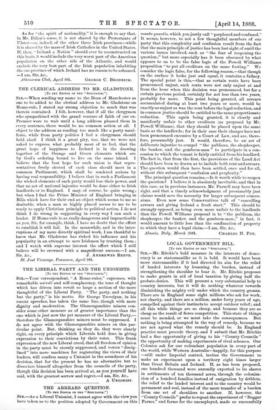THE ARREARS QUESTION.
[To TEE EDITOR OF THE " SPECTATOR."]
Sia.,—As a Liberal Unionist, I cannot agree with the view you have taken as to the position adopted by Government on this
vezata gucestio, which you justly call "perplexed and confused." It seems, however, to not a few thoughtful members of our party that this complexity and confusion result from the fact that the main principle of justice has been lost sight of amid the various issues involved, such as " the fear of reopening the question ;" but more especially has it been obscured by what appears to us to be the false logic of the Powell Williams proposition "to put all creditors on the same footing." We consider the logic false, for the following reason,—that though on the surface it looks just and equal, it contains a fallacy. The special point is this,—that as certain rents have been pronounced unjust, such rents were not only unjust at and from the hour when this decision was pronounced, but for a certain previous period, certainly for not less than two years, probably for more. This point being granted, all arrears accumulated during at least two years or more, would be exactly as unjust as was the rent before the legal reduction, and in common justice should be entitled to the same proportionate reduction. This again being granted, it is clearly and manifestly unfair to other creditors (as proposed by Mr. Powell Williams), that they should be placed upon the same basis as the landlords ; for in their case their charges have not been pronounced excessive by a Court of Law, and are, there- fore, presumably just. It would, therefore, be an act of deliberate injustice to compel " the publican, the shopkeeper, the banker, and the gombeen-man " to participate in a con- cession to which the tenant is fairly entitled from his landlord. The fact is, that from the first, the provisions of the Land Act should have been so drawn as to include both rent and arrears. The question would then have been settled, once and for all, without this subsequent "confusion and perplexity."
The principal question remains,—Is it worth while to reopen the question? I believe it is absolutely inevitable, and that in this case, as in previous instances, Mr. Parnell may have been right, and that a timely acknowledgment of presumably just claims would save the necessity for larger subsequent conces- sions. Even now some Conservatives talk of " cancelling arrears and giving Ireland a fresh start." This should be strongly opposed, as being even more unfair to the landlords than the Powell Williams proposal is to "the publican, the shopkeeper, the banker, and the gombeen-man ;" in fact, it would amount to little less than the confiscation of property to which they have a legal claim.—I am, Sir, &c.,


































 Previous page
Previous page